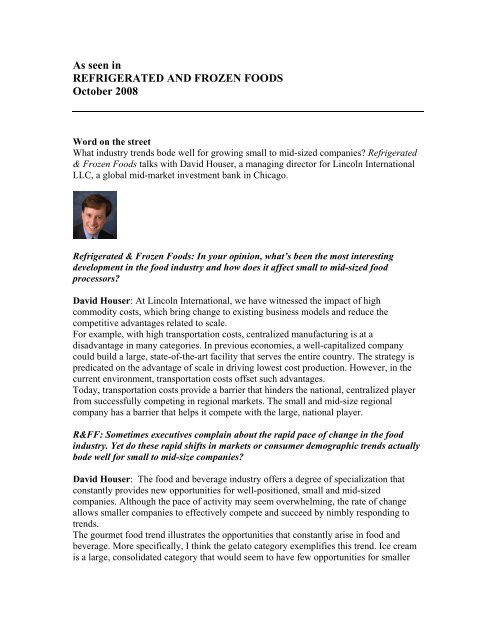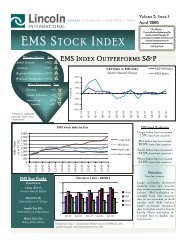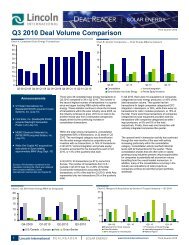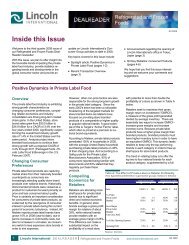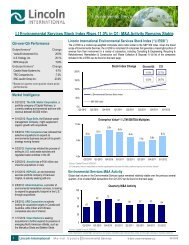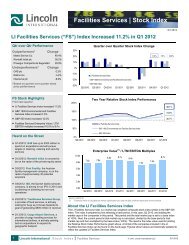Word on the street - Lincoln International
Word on the street - Lincoln International
Word on the street - Lincoln International
Create successful ePaper yourself
Turn your PDF publications into a flip-book with our unique Google optimized e-Paper software.
As seen in<br />
REFRIGERATED AND FROZEN FOODS<br />
October 2008<br />
<str<strong>on</strong>g>Word</str<strong>on</strong>g> <strong>on</strong> <strong>the</strong> <strong>street</strong><br />
What industry trends bode well for growing small to mid-sized companies? Refrigerated<br />
& Frozen Foods talks with David Houser, a managing director for <strong>Lincoln</strong> Internati<strong>on</strong>al<br />
LLC, a global mid-market investment bank in Chicago.<br />
Refrigerated & Frozen Foods: In your opini<strong>on</strong>, what’s been <strong>the</strong> most interesting<br />
development in <strong>the</strong> food industry and how does it affect small to mid-sized food<br />
processors?<br />
David Houser: At <strong>Lincoln</strong> Internati<strong>on</strong>al, we have witnessed <strong>the</strong> impact of high<br />
commodity costs, which bring change to existing business models and reduce <strong>the</strong><br />
competitive advantages related to scale.<br />
For example, with high transportati<strong>on</strong> costs, centralized manufacturing is at a<br />
disadvantage in many categories. In previous ec<strong>on</strong>omies, a well-capitalized company<br />
could build a large, state-of-<strong>the</strong>-art facility that serves <strong>the</strong> entire country. The strategy is<br />
predicated <strong>on</strong> <strong>the</strong> advantage of scale in driving lowest cost producti<strong>on</strong>. However, in <strong>the</strong><br />
current envir<strong>on</strong>ment, transportati<strong>on</strong> costs offset such advantages.<br />
Today, transportati<strong>on</strong> costs provide a barrier that hinders <strong>the</strong> nati<strong>on</strong>al, centralized player<br />
from successfully competing in regi<strong>on</strong>al markets. The small and mid-size regi<strong>on</strong>al<br />
company has a barrier that helps it compete with <strong>the</strong> large, nati<strong>on</strong>al player.<br />
R&FF: Sometimes executives complain about <strong>the</strong> rapid pace of change in <strong>the</strong> food<br />
industry. Yet do <strong>the</strong>se rapid shifts in markets or c<strong>on</strong>sumer demographic trends actually<br />
bode well for small to mid-size companies?<br />
David Houser: The food and beverage industry offers a degree of specializati<strong>on</strong> that<br />
c<strong>on</strong>stantly provides new opportunities for well-positi<strong>on</strong>ed, small and mid-sized<br />
companies. Although <strong>the</strong> pace of activity may seem overwhelming, <strong>the</strong> rate of change<br />
allows smaller companies to effectively compete and succeed by nimbly resp<strong>on</strong>ding to<br />
trends.<br />
The gourmet food trend illustrates <strong>the</strong> opportunities that c<strong>on</strong>stantly arise in food and<br />
beverage. More specifically, I think <strong>the</strong> gelato category exemplifies this trend. Ice cream<br />
is a large, c<strong>on</strong>solidated category that would seem to have few opportunities for smaller
players. However, <strong>the</strong> gelato category is growing remarkably at both <strong>the</strong> retail and<br />
foodservice channels.<br />
Although it’s still a small category, gelato lacks a large, well-capitalized incumbent<br />
brand. The category also benefits from healthy eating trends because true artisan gelato is<br />
lower in fat than most American ice creams. Recognizing both <strong>the</strong> growth and<br />
opportunity, Encore C<strong>on</strong>sumer Capital, a San Francisco-based private equity firm<br />
specializing in food and beverage investments, recently made an investment in Ciao<br />
Bella.<br />
R&FF: From an investment banking perspective, what are a few food and beverage<br />
trends that you are watching?<br />
Houser: As I menti<strong>on</strong>ed, <strong>the</strong> gourmet food trend is exciting. Despite <strong>the</strong> ec<strong>on</strong>omy, we<br />
c<strong>on</strong>tinue to see a number of rapidly growing food companies in high growth, gourmet<br />
niches of mature categories. Interestingly, although <strong>the</strong> ec<strong>on</strong>omy has impacted restaurants<br />
and foodservice – gourmet foods in certain retail categories are holding up better as<br />
“foodies” decide to spend <strong>the</strong>ir food dollars for meals at home. O<strong>the</strong>r fascinating trends<br />
c<strong>on</strong>tinue in healthy eating and private label.<br />
R&FF: How about <strong>the</strong> impact of higher commodity prices?<br />
Houser: Perhaps <strong>the</strong> most fluid trend relates to commodity prices. When commodity<br />
prices initially spiked, we saw immediate margin declines for food companies. These<br />
businesses <strong>the</strong>n went en masse for price increases that offset <strong>the</strong> higher commodity costs.<br />
In this envir<strong>on</strong>ment, we have seen a change in retailer behavior in some food categories.<br />
In evaluating competing food suppliers, <strong>the</strong> price volatility almost forces <strong>the</strong> retailers to<br />
focus less <strong>on</strong> price and more <strong>on</strong> product quality (or o<strong>the</strong>r category management criteria).<br />
Clearly, every category is different, but <strong>the</strong> point is that volatility clearly has its benefits.<br />
R&FF: So have rising costs affected merger and acquisiti<strong>on</strong> interest, activity?<br />
Houser: On food and beverage deals at <strong>Lincoln</strong> Internati<strong>on</strong>al, investor interest remains<br />
very str<strong>on</strong>g. In my opini<strong>on</strong>, investor appetite for food and beverage companies greatly<br />
exceeds <strong>the</strong> supply of attractive opportunities. As a result, food and beverage valuati<strong>on</strong><br />
multiples are higher than those in o<strong>the</strong>r industries. However, <strong>the</strong> financial and commodity<br />
markets have a significant impact <strong>on</strong> deal activity.<br />
R&FF: Please tell us a little more.<br />
Houser: Financial investors such as private equity firms need to invest capital. They are<br />
looking for industries that provide safer returns and less risk in a challenging ec<strong>on</strong>omy.<br />
Food and beverage companies – while having <strong>the</strong>ir own issues – are generally viewed as<br />
“safe havens” during such times. However, private equity firms now have less access to<br />
borrowed m<strong>on</strong>ey than strategic acquirers. Fur<strong>the</strong>rmore, <strong>the</strong>y have limited ability to<br />
overcome challenges related to rising commodity costs.
For <strong>the</strong>se reas<strong>on</strong>s, strategic acquirers are more competitive in <strong>the</strong> current M&A market.<br />
In general, strategic acquirers, such as publicly traded food and beverage corporati<strong>on</strong>s,<br />
have significant cash <strong>on</strong> <strong>the</strong>ir balance sheets. With limited volume growth, <strong>the</strong> strategic<br />
investors are looking to acquire companies ra<strong>the</strong>r than dividend <strong>the</strong> excess cash to<br />
shareholders. In additi<strong>on</strong>, strategic acquirers generally understand and can overcome <strong>the</strong><br />
challenges of <strong>the</strong> commodity markets. For <strong>the</strong>se reas<strong>on</strong>s, strategic acquirers are better<br />
positi<strong>on</strong>ed to make acquisiti<strong>on</strong>s.<br />
R&FF: Would you share a few thoughts about <strong>the</strong> coming year? Where might we see<br />
<strong>the</strong> most merger and acquisiti<strong>on</strong> activity?<br />
Houser: From an investment banking perspective, <strong>the</strong> current financial crisis requires us<br />
to closely watch macroec<strong>on</strong>omic trends that will dramatically alter <strong>the</strong> flavor of merger<br />
and acquisiti<strong>on</strong> activity in 2009.<br />
In 2009, acquisiti<strong>on</strong>s by strategic acquirers will account for a large porti<strong>on</strong> of M&A<br />
activity. With credit in short supply, private equity firms (that rely greatly <strong>on</strong> borrowed<br />
m<strong>on</strong>ey) generally cannot offer premium valuati<strong>on</strong>s for middle market food and beverage<br />
companies. While private equity still has a significant interest in food and beverage<br />
investments, <strong>the</strong> lack of available credit makes private equity firms less competitive in<br />
acquiring companies in <strong>the</strong> current market<br />
Potential sellers will realize <strong>the</strong> importance of strategic outcomes. Savvy business owners<br />
will reflect this c<strong>on</strong>siderati<strong>on</strong> in determining <strong>the</strong> timing of <strong>the</strong> sale, <strong>the</strong> process for selling<br />
<strong>the</strong> company, and <strong>the</strong> choice am<strong>on</strong>g financial advisors.<br />
R&FF: Please tell us a little about <strong>Lincoln</strong> Internati<strong>on</strong>al’s involvement in <strong>the</strong> industry.<br />
Houser: Approximately 70 percent of <strong>Lincoln</strong> Internati<strong>on</strong>al’s food and c<strong>on</strong>sumer<br />
transacti<strong>on</strong>s are sales to strategic acquirers. Based <strong>on</strong> a review of investment banking<br />
websites, we are more than 50 percent more likely to drive a strategic outcome than o<strong>the</strong>r<br />
M&A advisors.<br />
We drive this success in three critical ways. First, we take an internati<strong>on</strong>al approach that<br />
is unique in <strong>the</strong> middle market. With <strong>Lincoln</strong> offices in nine countries, we ensure that we<br />
can penetrate strategic investors around <strong>the</strong> world. With <strong>the</strong> weakness of <strong>the</strong> U.S.<br />
currency, foreign investors are more active than ever, and our internati<strong>on</strong>al presence is<br />
now much more important to small and mid-sized companies.<br />
In additi<strong>on</strong>, having a dedicated food and c<strong>on</strong>sumer group provides us with industry<br />
knowledge and experience, as well as key relati<strong>on</strong>ships with corporate buyers. Finally,<br />
we are dedicated to quality executi<strong>on</strong> which, to <strong>Lincoln</strong>, means having experienced M&A<br />
professi<strong>on</strong>als formulate and execute a strategy to provide <strong>the</strong> best outcome possible for<br />
our clients.


